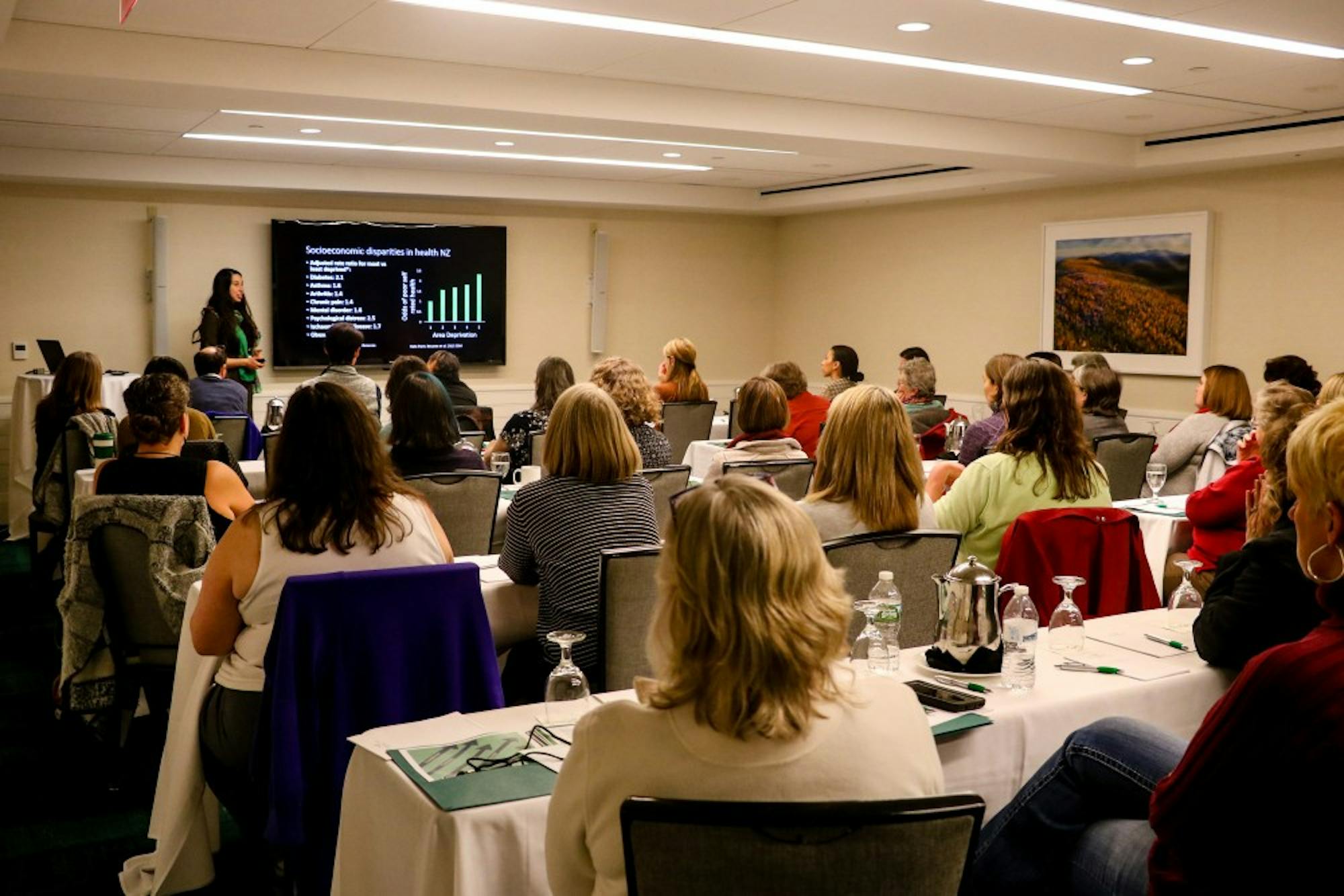“One people, one nation, one destiny” was the guiding mantra for Office for Institutional Diversity and Equity director Theodosia Cook when she planned IDE’s second annual summit on Oct. 18. The event, which was held in the Hanover Inn, invited community members, Dartmouth faculty and staff and representatives from other regional colleges to explore issues of poverty and equity, the summit’s theme this year. One hundred and twenty seven participants attended the event, representing an increase of over 50 attendees compared to last year’s 75.
The summit allowed participants to see that despite their different socioeconomic backgrounds, their futures are intertwined, Cook said. She added that she has aspirations for the summit to foster a culture of inclusivity in the Upper Valley.
“We are trying to shed light on the privileges and marginalizations that everyone encompasses, and to do that, we have to start having conversations that are uncomfortable,” Cook said. “We provide a space for people to feel safe but also exude bravery in being vulnerable.”
This year, the format of the summit changed from one and a half days to just one, with the centerpiece being a keynote presentation by Jessica Santos, senior research associate at the Institute on Assets and Social Policy at Brandeis University.
The event also included many workshops for attendees to choose from. Director of the First Year Student Enrichment Program Jay Davis ’90 led a workshop entitled “Class in the Classroom: Helping First-Generation and Low-Income Students to Thrive.”
“My goal in my presentation was to help people understand the challenges that can face first-generation students in their transitions to schools like Dartmouth and to understand the ways that Dartmouth supports these amazing students,” Davis said.
Cook and Davis both recognized the heterogeneity of the audience at the day-long summit, which Davis said was not only a reflection of Dartmouth’s diversity, but also a factor for speakers to consider when crafting their presentations.
“Some people in the room work with similar populations, and others don’t at all,” Davis said. “My goal was to help people from wherever they’re coming [from] to understand what the complexity of experiences could be for first-generation students at Dartmouth.”
Cook added that audience members exhibited varying levels of comfort with subject matters discussed in the workshops.
“For some people who attended, [the summit] was [like] a hug because now people understand [their] circumstance,” Cook said. “[They] don’t have to say it. Or [they] can put specific terms to it — there is a whole field of research around [their] particular marginalization. So some people may walk away feeling like, ‘I’m seen, I’m heard, I’m here.’”
Outside of the IDE office, other organizations around campus found ways to get involved with the summit. Sustainability fellow Josef Fairbanks ’17 was given funding by the Dartmouth Sustainability Office to attend the event. Fairbanks said he was able to use the knowledge he gained from the summit and apply it in an environmental context.
“As we say so often, because sustainability challenges are systemic and multifaceted, we need diverse points of view to generate effective solutions,” Fairbanks said. “We are constantly asking ourselves ... how we can make [the Sustainability Office] a more inclusive space so that anyone who wants to have a voice in the conversation feels like they are being heard.”
Although the IDE summit speakers had many important lessons to impart, both Cook and Fairbanks agreed the biggest strength of the conference lay in the dialogue created by community members. Fairbanks said he used the summit as an opportunity to step outside his daily routine at Dartmouth and gain perspective from people who are also part of the Upper Valley community but who offer vastly different perspectives.
“When you’re engaged in this kind of work, it’s easy to get tunnel vision, and I’m grateful for the reminder that issues of inequity and injustice in our community aren’t limited to Dartmouth’s campus,” Fairbanks said. “I talked to a lot of community members who are tackling justice issues in really creative ways. Learning from others’ work helps me re-frame many of the challenges I see on a daily basis as opportunities for change. Even in spite of some difficult conversations I had, I left the summit with a feeling of hope.”




